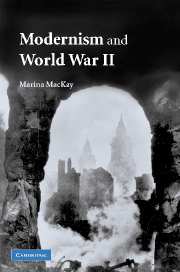Book contents
- Frontmatter
- Contents
- Acknowledgements
- Introduction: Modernism beyond the Blitz
- Chapter 1 Virginia Woolf and the pastoral patria
- Chapter 2 Rebecca West's anti-Bloomsbury group
- Chapter 3 The situational politics of Four Quartets
- Chapter 4 The neutrality of Henry Green
- Chapter 5 Evelyn Waugh and the ends of minority culture
- Coda: National historiography after the post-war settlement
- Notes
- Bibliography
- Index
Chapter 1 - Virginia Woolf and the pastoral patria
Published online by Cambridge University Press: 22 September 2009
- Frontmatter
- Contents
- Acknowledgements
- Introduction: Modernism beyond the Blitz
- Chapter 1 Virginia Woolf and the pastoral patria
- Chapter 2 Rebecca West's anti-Bloomsbury group
- Chapter 3 The situational politics of Four Quartets
- Chapter 4 The neutrality of Henry Green
- Chapter 5 Evelyn Waugh and the ends of minority culture
- Coda: National historiography after the post-war settlement
- Notes
- Bibliography
- Index
Summary
If the people who rule Britain are made of the same stuff as the little people I have seen today … then the defense of Britain will be something of which men will speak with awe and admiration so long as the English language survives. Politicians have repeatedly called this a people's war. These people deserve well of their leaders.
Ed Murrow, broadcasting from London, 18 August 1940.London looked merry and hopeful, wearing her wounds like stars; why do I dramatise London perpetually? When I see a great smash like a crushed match box where an old house stood I wave my hand to London. What I'm finding odd and agreeable and unwonted is the admiration this war creates – for every sort of person: chars, shopkeepers, even much more remarkably, for politicians – Winston at least, and the tweed wearing sterling dull women here, with their grim good sense: organising First aid, putting out bombs for practise [sic], and jumping out of windows to show us how. We burnt an incendiary bomb up on the down last night. It was a lovely tender autumn evening, and the white sputter of the bomb was to me, who never listened to the instructions, rather lovely. I'd almost lost faith in human beings, partly owing to my immersion in the dirty water of artists [sic] envies and vanities while I worked at Roger [Roger Fry]. Now hope revives again.
Virginia Woolf, writing to Ethel Smyth, 25 September 1940.- Type
- Chapter
- Information
- Modernism and World War II , pp. 22 - 43Publisher: Cambridge University PressPrint publication year: 2007



